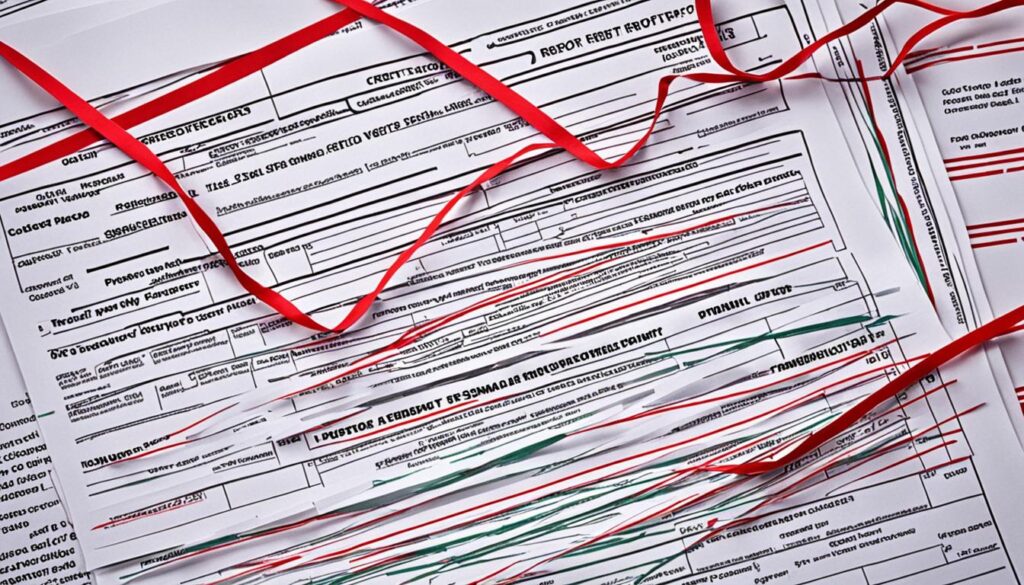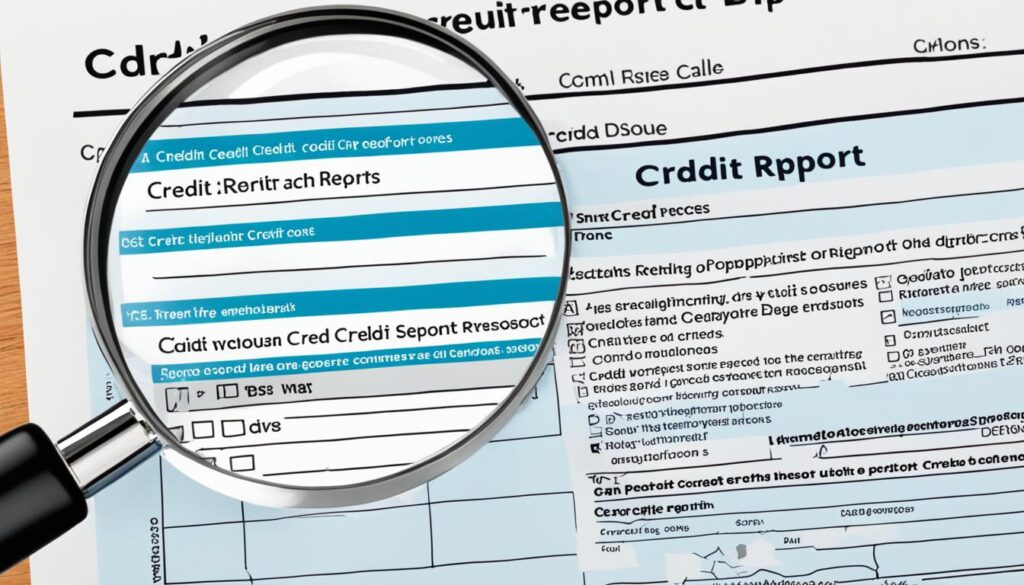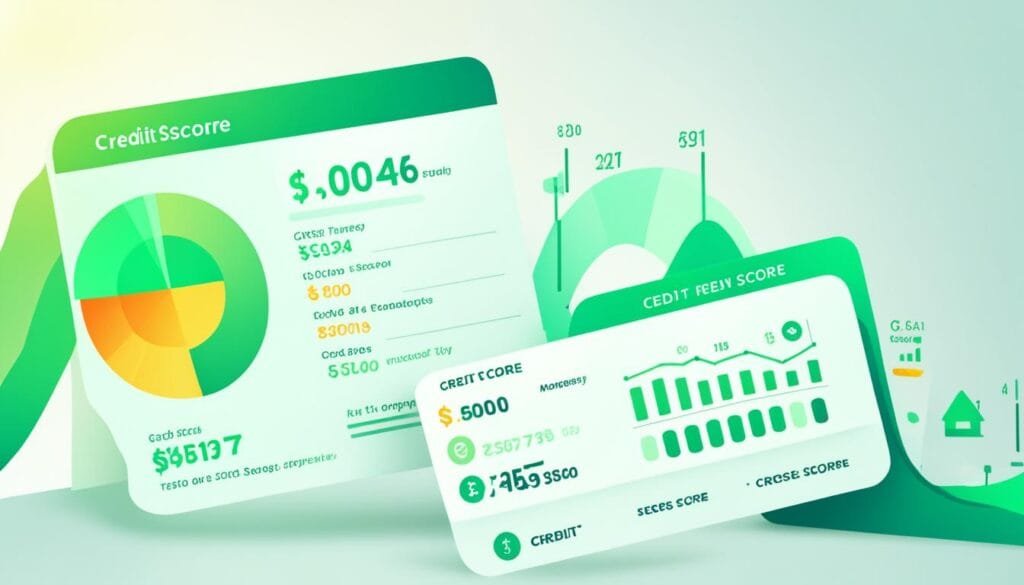Imagine this scenario: You’re preparing to buy your dream home. You’ve found the perfect property, negotiated a great deal, and secured a mortgage pre-approval. Everything seems to be falling into place until your lender pulls your credit report. To your shock and dismay, you discover multiple errors that have tarnished your credit history.
Meet Sarah, an aspiring homeowner who found herself in this exact predicament. She had always been diligent about paying her bills on time and maintaining a healthy credit score. However, when she reviewed her credit report, she noticed several inaccuracies that could potentially derail her dreams of homeownership. Frustrated but determined, Sarah embarked on a mission to dispute these errors and set the record straight.
With a bit of research and guidance, Sarah educated herself about the credit report dispute process. She understood that the accuracy of her credit report was crucial, as it could impact her ability to secure a loan, obtain affordable insurance rates, and even land her dream job. Armed with this knowledge, Sarah diligently worked through the steps required to correct the mistakes on her credit report.
In this article, we will explore the process of disputing errors on your credit report effectively. From understanding the importance of accurate credit reports to learning how to navigate the dispute process with credit bureaus and businesses, we will provide you with the tools and information you need to protect your creditworthiness and financial future.
Key Takeaways:
- Regularly check your credit report to ensure its accuracy and identify any potential errors.
- Errors on your credit report can negatively impact your ability to borrow money, secure insurance, or get a job.
- You have the right to receive free copies of your credit report from each of the three major credit bureaus (Experian, Equifax, and TransUnion) once every 12 months.
- If you find mistakes in your credit report, it’s crucial to take steps to correct them promptly.
- Disputing credit report errors involves contacting the credit bureau and the business that reported the inaccurate information.
The Importance of Accurate Credit Reports
Accurate credit reports play a vital role in various aspects of your financial life. They directly affect your buying power, job opportunities, housing prospects, and insurance rates. When businesses assess your creditworthiness, they rely on the information provided by credit bureaus. Therefore, it is crucial to ensure that the information in your credit report is accurate and complete.
Errors on your credit report can have serious consequences. They can negatively impact your ability to obtain credit, insurance, or even secure employment. For instance, a mistaken negative entry on your credit report can lead to higher interest rates on loans or credit card applications being denied altogether. Similarly, inaccuracies in your employment history or educational background can affect job prospects. Therefore, it is essential to regularly check your credit report and address any discrepancies promptly.
By monitoring your credit report, you can identify and correct errors that may arise from various reasons such as:
- Incorrect personal information, such as incorrect name, address, or Social Security number
- Inaccurate account information, including accounts that are not yours or accounts erroneously reported as delinquent or in collections
- Duplicate entries, where the same account appears multiple times with different creditors
- Incomplete payment history, where timely payments are not reflected or erroneous late payment records are present
- Identity theft, where fraudulent accounts or inquiries appear on your credit report
Addressing these credit report dispute reasons is crucial to maintaining an accurate credit profile and ensuring fair access to financial opportunities. It is your right as a consumer to have correct and updated information on your credit report, and credit bureaus have a responsibility to ensure the accuracy and integrity of the data they report.
Take control of your financial future by regularly reviewing your credit report and disputing any inaccuracies promptly. By doing so, you can protect your creditworthiness and improve your chances of obtaining favorable loan terms, securing housing, and benefiting from lower insurance rates.
Key Takeaways:
- Accurate credit reports impact your buying power, job opportunities, housing prospects, and insurance rates.
- Errors on your credit report can negatively affect your ability to obtain credit, insurance, or secure employment.
- Regularly monitoring your credit report helps identify and correct errors caused by various factors, including incorrect personal information, inaccurate account information, duplicate entries, incomplete payment history, and identity theft.
- Disputing any inaccuracies on your credit report is essential to maintain an accurate credit profile and ensure fair access to financial opportunities.
Correcting Mistakes in Your Credit Report
If you find mistakes in your credit report, it is crucial to take steps to correct them. Both the credit bureau and the business that provided the information are required to correct any wrong or incomplete information free of charge.
To dispute a mistake in your credit report, you need to contact the credit bureau and the business that reported the inaccurate information. Provide a detailed explanation of what you believe is wrong, include supporting documents and the credit bureau’s dispute form if available.
Send your dispute letter by certified mail to ensure you have proof of delivery. The credit bureau has 30 days to investigate your dispute and must provide you with the results in writing. If the dispute results in a change, you are entitled to a free copy of your credit report and the credit bureau must notify anyone who received your report within the past six months.
Steps to Correct Mistakes in Your Credit Report:
- Contact the credit bureau and the business that reported the inaccurate information.
- Provide a detailed explanation of the mistake.
- Include supporting documents and the credit bureau’s dispute form, if available.
- Send your dispute letter by certified mail.
- Wait for the credit bureau’s investigation, which must be completed within 30 days.
- Receive the results of the dispute in writing.
- If the dispute is successful, obtain a free copy of your credit report.
- Ensure the credit bureau notifies anyone who received your report within the past six months about the correction.

Disputing Credit Report Errors with Credit Bureaus and Businesses
If you discover errors on your credit report, it is important to take action to correct them promptly. You can dispute these errors with the three major credit bureaus: Equifax, Experian, and TransUnion. Each bureau has its own dispute process to address inaccuracies in your credit report.
The Credit Report Dispute Process Step by Step:
- Start by visiting the websites of the credit bureaus (Equifax, Experian, and TransUnion) to initiate the dispute process online. Look for the dedicated dispute section on their websites.
- Alternatively, you can dispute the errors by mail or phone. Each bureau provides specific instructions on their websites for these methods.
- Most often, you will need to fill out a dispute form, providing details about the erroneous information and explaining why it is incorrect. Be sure to include any supporting documents that can substantiate your claim.
- Submit the completed dispute form along with the supporting documents to the credit bureaus. Keep copies of everything for your records.
- The credit bureaus have a legal obligation to investigate your dispute within a specific timeframe. Generally, they have 30 days to complete the investigation and provide you with a written response.
- If the investigation results in a change to your credit report, the credit bureaus are required to notify all three bureaus and update the information in your file.
- If the investigation fails to resolve the dispute, you can request that a statement of the dispute be included in your credit file and in future reports.
In addition to disputing errors with the credit bureaus, you can also directly dispute the inaccurate information with the business that provided it. Write a detailed letter explaining the mistake, provide any relevant supporting documents, and send it to the business via certified mail to ensure proof of delivery.
The Credit Report Dispute Time Frame:
The credit bureaus are legally obligated to investigate your dispute within 30 days of receiving your submission. However, the actual time frame may vary depending on the complexity of the dispute and the availability of the necessary information. It is important to keep in mind that resolving credit report errors may take several weeks or even months.
By actively disputing credit report errors with the credit bureaus and businesses, you can ensure the accuracy of your credit information and maintain a healthy credit profile. It is essential to follow the specific process outlined by each credit bureau and provide all necessary documentation and explanations to support your dispute.

Monitoring Your Credit Reports and Reporting Scams
Regularly monitoring your credit reports is crucial to ensure that any errors have been corrected and to detect signs of identity theft or fraudulent activity. By staying vigilant and proactive, you can protect your financial well-being and maintain a healthy credit history.
Accessing your credit reports is easy and free. Each year, you can obtain a free copy of your credit report from each of the three major credit bureaus – Experian, Equifax, and TransUnion – through AnnualCreditReport.com. Some bureaus also offer additional free reports per year, so it’s important to take advantage of these opportunities.
Reviewing your credit reports allows you to verify the accuracy of the information and identify any discrepancies or errors. Look for incorrect personal information, unfamiliar accounts, or suspicious activity that could indicate identity theft. If you notice any discrepancies, it’s crucial to take immediate action to rectify the situation.
If you identify a scam, fraud, or encounter bad business practices, reporting them is essential to prevent financial harm to yourself and others. The Federal Trade Commission (FTC) provides a platform for reporting scams and fraudulent activities at ReportFraud.ftc.gov.
Reporting Scams and Fraudulent Activity
| Step | Action |
|---|---|
| 1 | Visit ReportFraud.ftc.gov |
| 2 | Provide detailed information about the scam or fraudulent activity |
| 3 | Include any supporting documents or evidence |
| 4 | Submit the report |
By reporting scams and fraudulent activities, you contribute to safeguarding yourself and others from potential financial damage. Stay proactive, keep a close eye on your credit reports, and take swift action whenever necessary to ensure the accuracy of your credit information.
How Does the Credit Report Dispute Process Differ from Pay for Delete Agreements?
When disputing a credit report, the process involves challenging inaccurate information with the credit bureau. In contrast, key insights on pay for delete agreements entail negotiating with a creditor to remove negative information from the report in exchange for payment. The dispute process is formal, while pay for delete agreements are more informal negotiations.
Conclusion
Navigating the credit report dispute process effectively is crucial for maintaining an accurate credit history and elevating your credit score. Regularly checking your credit report, disputing errors with the credit bureaus and businesses, and monitoring for scams and fraudulent activity are essential steps to ensure the accuracy of your credit information and protect yourself from potential financial harm.
It is important to remember that a credit report error can have significant consequences on your ability to secure credit, insurance, and employment opportunities. By taking the necessary steps to dispute and correct any inaccuracies, you can maintain a healthy credit profile and improve your overall financial well-being.
Make it a habit to review your credit report regularly and promptly address any errors or discrepancies. This proactive approach can help you maintain a positive credit standing, which is crucial in today’s financial landscape. By staying vigilant and engaged in managing your credit information, you empower yourself to make informed financial decisions and achieve your long-term financial goals.
FAQ
What is the importance of accurate credit reports?
Accurate credit reports are essential as they impact your buying power, job opportunities, housing prospects, and insurance rates. Credit bureaus provide the information in your credit report to businesses to assess your creditworthiness. It is important to ensure that the information in your report is accurate and complete. Errors on your credit report can negatively affect your ability to obtain credit, insurance, or even a job. Regularly checking your credit report can help identify and correct any inaccuracies.
How do I correct mistakes in my credit report?
If you find mistakes in your credit report, it is crucial to take steps to correct them. Both the credit bureau and the business that provided the information are required to correct any wrong or incomplete information free of charge. To dispute a mistake in your credit report, you need to contact the credit bureau and the business that reported the inaccurate information. Provide a detailed explanation of what you believe is wrong, include supporting documents and the credit bureau’s dispute form if available. Send your dispute letter by certified mail to ensure you have proof of delivery. The credit bureau has 30 days to investigate your dispute and must provide you with the results in writing. If the dispute results in a change, you are entitled to a free copy of your credit report and the credit bureau must notify anyone who received your report within the past six months.
How do I dispute credit report errors with credit bureaus and businesses?
Disputing credit report errors can be done online, by mail, or by phone with the three major credit bureaus: Equifax, Experian, and TransUnion. Each bureau has its own process, which may include filling out a dispute form, providing supporting documents, and explaining the mistake. It is recommended to dispute errors with each credit bureau that has the mistake. If the credit bureaus find the reported information to be inaccurate, they must notify all three bureaus to correct the information in your file. The credit bureaus have 30 days to investigate the dispute. If the investigation doesn’t resolve the dispute, you can request a statement of the dispute to be included in your file and future reports. Additionally, you can dispute the error with the business that provided the inaccurate information. Include a detailed letter along with any supporting documents. The business must investigate the dispute and inform the credit bureau of any necessary corrections.
How can I monitor my credit reports and report scams?
It is essential to regularly monitor your credit reports to ensure that any errors have been corrected and to detect any signs of identity theft or fraudulent activity. You can access your credit reports for free from each bureau once a year at AnnualCreditReport.com. Some bureaus also offer additional free reports per year. If you identify a scam, fraud, or bad business practices, report it to the Federal Trade Commission (FTC) at ReportFraud.ftc.gov. Reporting scams helps protect yourself and others from potential financial harm.
How can I navigate the credit report dispute process effectively?
Navigating the credit report dispute process effectively is crucial for maintaining an accurate credit history and improving your credit score. By regularly checking your credit report, disputing errors with the credit bureaus and businesses, and monitoring for scams and fraudulent activity, you can ensure the accuracy of your credit information and protect yourself from potential financial harm. Remember, a credit report error can have significant consequences on your ability to secure credit, insurance, and employment opportunities. Take the necessary steps to dispute and correct any inaccuracies to maintain a healthy credit profile.
How can I elevate my credit score?
Elevating your credit score involves managing your credit responsibly, paying bills on time, minimizing credit card balances, and avoiding unnecessary credit applications. Additionally, regularly checking your credit reports, disputing and correcting any errors, and monitoring for scams can also help improve your credit score over time. Establishing good credit habits and maintaining an accurate credit history are key to elevating your score and securing favorable credit and financial opportunities.

